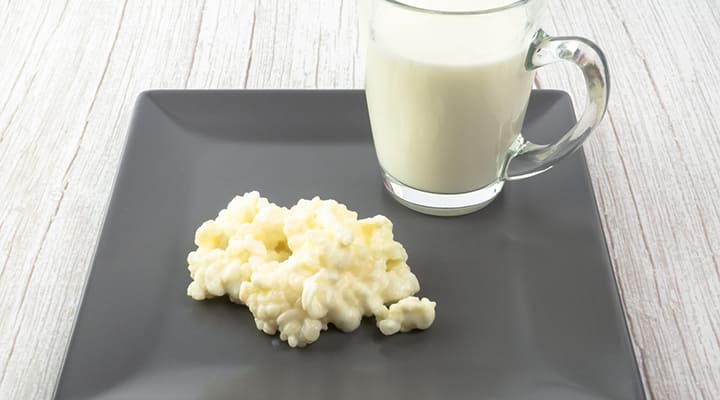
What Are the Best Probiotic Strains? 7 Probiotic Facts
Published: February 2020 | Updated: November 2024
Surely, you've seen the headlines: probiotics are good for your gut health. But when you start digging deeper and read about "microbiome" this and "Lactobacillus acidophilus" that, it's all Greek to you (or, er, Latin).
Not to worry: we've got your cheat sheet. In this blog, we'll explore what exactly probiotics are, some of the benefits of probiotics, the truth behind fermented foods, what to look for in a probiotic supplement and much more!
Before we dive in, let's cover a few must-know details about probiotics:
- Probiotics are most often found in the form of bacteria, but some of them are yeasts.
- The microbiome is the collective name of all the microbes living in and on the human body. That being said, your body doesn't naturally contain probiotics.
- Just because something is claiming to be amazing for the health of your microbiome, it doesn't mean the product is a probiotic. (More on that in a minute!)
Now that we've covered some of the basics and given you some introductory knowledge about probiotics, let's get a little more specific and go over seven important facts about probiotics that you should know.
7 things you should know about probiotics
1. Probiotics are beneficial for your health
If there's one thing experts agree on, it's that in the appropriate amounts (which in this case means in measured amounts), probiotics offer health benefits for their "host"—that's you!
While the handiwork of probiotics is most commonly evident in the gastrointestinal (GI) tract and the intestinal microbiota, certain probiotic strains can also support the heart, mood, immune system, women's health and beyond. There's a strain for virtually every health need you may have.
Pro tip: It's important to be discerning when looking for the right probiotic for you. If a product claims to be a probiotic, the health benefit has to have been proven. If a supplement says it's "good for your gut," make sure it's been studied to do what it's claiming!
2. There are 4 main families of probiotics
There are several core genera of microbial organisms that you'll commonly find in probiotics, but the four that you're most likely to encounter in probiotic formulas are Lactobacillus, Bifidobacterium, Saccharomyces and Streptococcus.
We identify probiotics by their strain, which includes the species, subspecies (if there is one), the genus and the alphanumeric designation. Just as an example, Lactobacillus (genera) reuteri (species) 30242 (alphanumeric designation) is a probiotic specific to heart health.
And that's only the tip of the iceberg! There are thousands of species of probiotics, and they're all special in their own ways.
For example, Saccharomyces boulardii is a yeast; Bifidobacterium longum primarily is found in your GI tract and is important for breaking down complex carbs; and Lactococcus lactis is involved in the fermentation of dairy. There truly is something for everyone!
3. The specific strains matter
When it comes to the type of probiotic you take, the strain matters. Every strain has its own health benefits—known as "strain-specific" benefits. It bears repeating that no single probiotic will deliver every health benefit you're looking for on its own, so it's wise to choose the strain that supports the health functions you've prioritized. Or, you can take multiple probiotics for different health needs.
Something else worth noting about strains: when it comes to probiotic products, the manufacturer should be listing not only the strain, but also the amount of the strain present within it. Otherwise it doesn't qualify as a probiotic supplement.
4. You should choose the right probiotic for your goals
You wouldn't take a supplement that supports heart health for your mood, and you wouldn't pick a digestive health formula for your joints, right? The same goes for probiotics! Remember that each strain is different, which means that the advantages that they offer are also going to be different.
Choosing the right probiotic comes down to picking the strain that offers the support you're looking for—whether that's general gut health, immune system health, liver health or something else! Identifying what you need to support comes first, and choosing the best probiotic to fit that need comes after.
Pro tip: Not sure where to start? Don't just go with your gut on this one. Take our quiz to help you choose the best probiotic supplements for you.
5. One probiotic stands out among the rest
Even among the four "main" families of probiotics that we discussed earlier, one gets the most applause: Lactobacillus acidophilus, the rockstar of probiotics. This species is considered the most popular among those who take probiotics.
Why is that? This species is well studied for the benefits it provides in different probiotic formulas. It also has been used safely and effectively for generations. But did you know that there are other Lactobacillus species besides acidophilus? Another popular and extensively studied one is rhamnosus. In fact, some formulas include them both, delivering both their benefits.
Talk about the best of both worlds!
Explore Our Best Prebiotic & Probiotic Supplements
6. You might want to take a prebiotic with a probiotic
First, let's talk about the difference between a probiotic and a prebiotic. While probiotics are live microorganisms that you consume, prebiotics are non-living substances. They act as substrates (kind of like "food") that support the live microbes that are already in your body.
Most prebiotics are dietary fibers and help support digestion, mineral absorption and the body's natural defenses. They can also support energy and glucose metabolism.
Each probiotic prefers a certain prebiotic though, so it's important to do your research when pairing them together. Specific prebiotics will primarily support certain microorganisms, which ultimately determines the health benefits they offer.
7. Some foods contain probiotics (but not always)
A lot of people talk about foods that contain probiotics, but it may come as a surprise to you that most of those actually don't! Rather, they contain live microorganisms, and that's not necessarily the same thing.
To be considered a probiotic food, they need to meet the same definition as any other probiotic: they must contain specific microorganisms, in the correct amount, that are known to provide a health benefit.
For instance, you can find live microbes in traditional fermented foods and drinks like sauerkraut, kimchi, and kombucha. And, certain types of yogurt and fermented milk (kefir) might contain probiotics. Other times, fermented foods go through processing and don't contain any live microbes at all.
But, generally speaking, these foods don't typically meet the requirements to be categorized as probiotics. This doesn't mean they aren't good for you, though! In fact, most of the foods we mentioned are still considered beneficial for your gut and overall health and are worth incorporating into your diet.
All of this means that if you're looking to incorporate more probiotics into your diet, food alone won't cut it. Your best bet is to get the proper dosage of pre- and probiotic dietary supplements.
Healthy lifestyle hack: Take your probiotics!
Now that you're a probiotics pro, let's get the party started. Alongside a healthy diet, regular physical activity, plenty of beauty sleep, and stress management, the right probiotic supplement can offer amazing benefits for your gut health (and more!). Speak with your healthcare provider about which strain might be the best fit for you.
References
- Hill C, et al. "The International Scientific Association for Probiotics and Prebiotics consensus statement on the scope and appropriate use of the term probiotic." Nature Reviews Gastroenterology & Hepatology. June 2014. https://www.nature.com/articles/nrgastro.2014.66
- Are Probiotics Right for You?" Tufts University. https://www.nutritionletter.tufts.edu/general-nutrition/are-probiotics-right-for-you/
- "Do All Fermented Foods Contain a Probiotic?" International Scientific Association for Probiotics and Prebiotics. 2020. https://isappscience.org/wp-content/uploads/2021/01/ProbioticsvsFermentedFoods.pdf
- "Prebiotics." International Scientific Association for Probiotics and Prebiotics. 2019. https://isappscience.org/wp-content/uploads/2019/04/Prebiotics_Infographic_rev1029.pdf
- "Probiotics." International Scientific Association for Probiotics and Prebiotics. 2019. https://isappscience.org/for-scientists/resources/probiotics/
- "Probiotics." National Institutes of Health. https://ods.od.nih.gov/factsheets/Probiotics-HealthProfessional/
- "Probiotics: The science of what they are and how they work." International Scientific Association for Probiotics and Prebiotics. https://isappscience.org/for-consumers/learn/probiotics/
Like what you read?
Please subscribe to get email updates on this blog.









